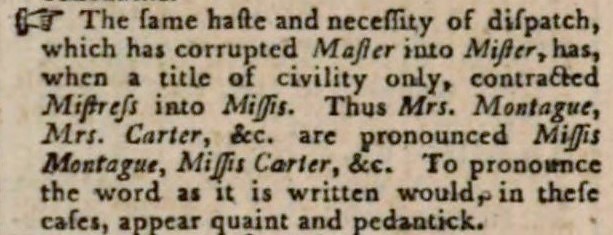Mr and Mrs were originally the abbreviations of master and mistress, while mister and missus (also spelt missis) are the renderings of the altered pronunciation of master and mistress in Mr and Mrs. (Similarly, miss was originally short for mistress.)
It must be noted however that, before being the rendering of the pronunciation of Mr, mister was a mere variant of master. The Acts of the Privy Council of England contain the following:
At Westminster, the xxvᵗʰ of October, 1551.
A lettre to the Lieutenaunt of the Tower to suffer the ij Mysters Bassetes to have accesse and speake for this one tyme with theyre brother, prisoner in the Tower.
An example of the use of the abbreviations Mr and Mrs for master and mistress is found in a letter written around 1600 by a certain R. P. “to William ffarington Esqu. and Mrs. ffarington”, which thus begins:
Right worshipfull and my singular good Mr. and Mrs. These shalbe to giue youre worshippes moste harty thanks for no lytell benefite done unto me at altymes.
The word mistress used to be a title of courtesy prefixed to the name of a married or unmarried woman. One of the earliest attestations of this usage is in a letter written, probably in 1450, to Margaret Paston (died 1484) by her estate agent Thomas Gnateshale; it thus begins:
To my ryght worchepfull Maystres Paston in hast.
Ryght worchepfull mastres, I recomawnde me to yow, &c.
One of the earliest attestations of the abbreviation Mrs prefixed to the name of a married or unmarried woman is found in the inventory of the goods of the parish of St. Mary Hill, London, in 1485-86:
Item, a corporas* case of nedyll work, the backside purpill velvett; and a fine corporas therein with semys of gold, of the gyfte of Mres. Julian Roche.
(* = corporal: a cloth on which the chalice and paten are placed during the celebration of the Eucharist)
Other early attestations appear in the account book of Sir Henry Willoughby (1451-1528), who had inherited the Wollaton and Middleton estates, in Nottinghamshire. In 1522, the name of a certain “Mystrys Mare Herbowtyll” was prefixed by Mtrs and Mrs.
The abbreviation Mrs was also used to mean wife, for example in the account book of Sir Francis Willoughby (1546-1596) in 1572:
The viij of November payd to my Mrs. for her quarteres allowance endinge at Myghellmas last past… xli.
The earliest known uses of the abbreviation Mr prefixed to the name of a man are in the Mayor of Exeter’s Articles of Complaint against the Bishop, Dean, and Chapter (around 1449). It is written for example that “one Mʳ Henry Webber wrongefully of mere malice and yvell wyll [= evil will] and by commaundement of the saide Bisshop” threatened the Bishop’s tenants of eviction if they paid the “dymes” to the city.
According to the New English Dictionary (1908), as the Oxford English Dictionary was known, in the latter half of the 17th century, there was a general tendency to confine the use of written abbreviations to words of inferior syntactic importance, such as prefixed titles. The form Mrs for mistress therefore fell into disuse except when prefixed to a name; and in this position the writing of the full form gradually became unusual. The contracted pronunciation represented by missus, or missis, became, for the prefixed title, first a permitted colloquial licence, and ultimately the only allowable pronunciation. When this stage was reached, Mrs, with the contracted pronunciation, became a distinct word from mistress.
Similarly, according to the same dictionary, although written in the full form until the latter half of the 17th century, master came to have the weakened pronunciation represented by mister whenever it was used as a prefixed title, and it became customary to always employ the abbreviated spelling for this use only. Hence, at the beginning of the 18th century, Mr and master were already regarded as distinct words.
Evidence as to the chronology of these changes is lacking but in A Critical Pronouncing Dictionary and Expositor of the English Language (1791), John Walker (1732-1807), English actor and lexicographer, wrote:
– Master. When this word is only a compellation of civility, as ‘Mr. Locke’, ‘Mr. Boyle’, &c. the ‘a’ is sunk, and an ‘i’ substituted in its stead, as if the word were written ‘Mister’, rhyming with ‘sister’. Any attempt to approach to the sound of ‘a’, by pronouncing it ‘mester’ or ‘muster’, ought to be carefully avoided.
– Mistress. The same haste and necessity of dispatch, which has corrupted ‘Master’ into ‘Mister’, has, when a title of civility only, contracted ‘Mistress’ into ‘Missis’. Thus ‘Mrs. Montague’, ‘Mrs. Carter’, &c. are pronounced ‘Missis Montague’, ‘Missis Carter’, &c. To pronounce the word as it is written would, in these cases, appear quaint and pedantick.

The written form missus, or missis, is used to mean wife; it is also a form of address to a woman. This is first recorded in Suffolk words and phrases; or, An attempt to collect the lingual localisms of that county (1823), by Edward Moor:
Misses. The usual way of speaking of one’s wife—“my misses;” or of addressing a woman, especially a matron—“prah take a pinch misses.”—For mistress, no doubt.
